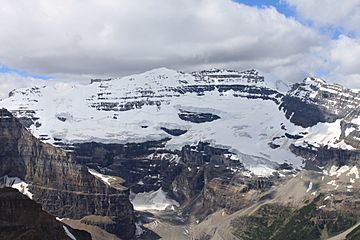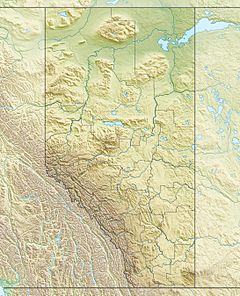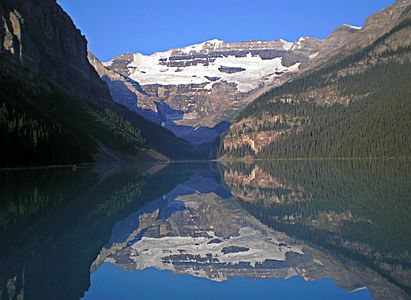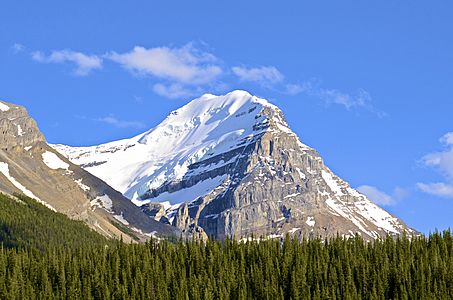Mount Victoria (Bow Range) facts for kids
- This article is for the mountain on the British Columbia-Alberta border in the Canadian Rockies. For the mountain in the Jervis Inlet area of the British Columbia Coast, see Mount Victoria (British Columbia).
Quick facts for kids Mount Victoria |
|
|---|---|

Mt. Victoria in August 2011 as seen from Fairview Mountain
|
|
| Highest point | |
| Elevation | 3,464 m (11,365 ft) |
| Prominence | 547 m (1,795 ft) |
| Parent peak | Hungabee Mountain 3490 m |
| Geography | |
| Country | Canada |
| Parent range | Bow Range |
| Topo map | NTS 83C/05 |
| Climbing | |
| First ascent | 1897 |
| Easiest route | South Summit, South-East Ridge II |
Mount Victoria, 3,464 metres (11,365 ft), is a mountain on the border between British Columbia and Alberta in the Canadian Rockies. It is located just northeast of Lake O'Hara in Yoho National Park and is also part of Banff National Park and is on the Continental Divide (which is the definition of the interprovincial boundary in this region).
The mountain is located on the western buttress of Abbot Pass while Mount Lefroy lies on the eastern side.
The mountain was named by J. Norman Collie in 1897 for Queen Victoria.
The first successful ascent was made in 1897 by J. Norman Collie, Arthur Michael, Charles Fay, and Peter Sarbach.
Geology
Mount Victoria is composed of sedimentary rock laid down during the Cambrian period. Formed in shallow seas, this sedimentary rock was pushed east and over the top of younger rock during the Laramide orogeny.
Climate
Based on the Köppen climate classification, Mount Victoria is located in a subarctic climate with cold, snowy winters, and mild summers. Temperatures can drop below −20 C with wind chill factors below −30 C.
Gallery




